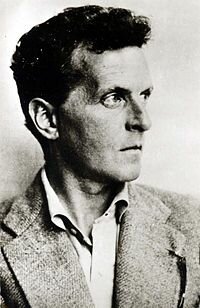 Ludwig Josef Johann Wittgenstein (26 April, 1889 – 29 April, 1951) was an Austrian philosopher who worked primarily in logic, the philosophy of mathematics, the philosophy of mind, and the philosophy of language. As one of the twentieth century's most important philosophers, his influence has been wide-ranging.
Ludwig Josef Johann Wittgenstein (26 April, 1889 – 29 April, 1951) was an Austrian philosopher who worked primarily in logic, the philosophy of mathematics, the philosophy of mind, and the philosophy of language. As one of the twentieth century's most important philosophers, his influence has been wide-ranging.Before his death at the age of 62, the only book-length work Wittgenstein had published was Tractatus Logico-Philosophicus. He worked on Philosophical Investigations in his later years, and it was published shortly after he died. Both of these works are regarded as highly influential in analytic philosophy.
Ludwig Wittgenstein was born in Vienna on 26 April 1889, to Karl and Leopoldine Wittgenstein. He was the youngest of eight children, born into one of the most prominent and wealthy families in the Austro-Hungarian empire. His father's parents, Hermann Christian and Fanny Wittgenstein, were born into Jewish families but later converted to Protestantism, and after they moved from Saxony to Vienna in the 1850s, assimilated into the Viennese Protestant professional classes. Ludwig's father, Karl Wittgenstein, became an industrialist and went on to make a fortune in iron and steel. Ludwig's mother Leopoldine, born Kalmus, was an aunt of the Nobel Prize laureate Friedrich von Hayek. Despite Karl's Protestantism, and the fact that Leopoldine's father was Jewish, the Wittgenstein children were baptized as Roman Catholics—the faith of their maternal grandmother—and Ludwig was given a Roman Catholic burial upon his death.
His notebook entries during the war reflect his contempt for the baseness, as he saw it, of his fellow soldiers. Throughout the war, Wittgenstein kept notebooks in which he frequently wrote philosophical and religious reflections alongside personal remarks. The notebooks reflect a profound change in his religious life: a militant atheist during his stint at Cambridge, Wittgenstein discovered Leo Tolstoy's The Gospel in Brief at a bookshop in Galicia. He devoured Tolstoy's commentary and became an evangelist of sorts; he carried the book everywhere he went and recommended it to anyone in distress (to the point that he became known to his fellow soldiers as "the man with the gospels"). Monk notes that at the end of his life, Wittgenstein still firmly believed in the Resurrection of Jesus. Wittgenstein's other religious influences include Saint Augustine, Fyodor Dostoevsky and, most notably, SØren Kierkegaard, whom Wittgenstein referred to as "a saint".
More...


No comments:
Post a Comment